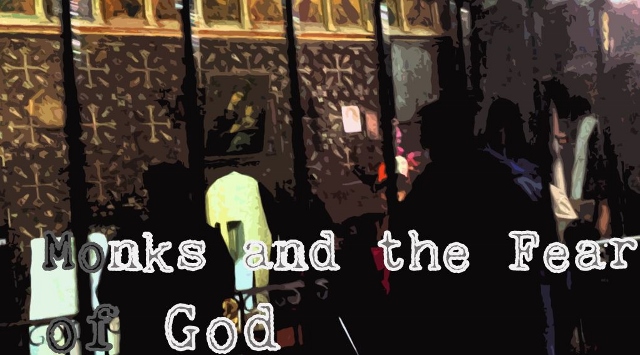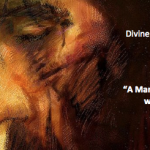The Coptic monk is one who, above all, abides in the presence of God. Whereas, it may happen that a member of the laity might avoid renting a flat immediately next to a church because the constant reminder of divine immanence can become burdensome (e.g., when a husband and wife argue, or when a child …
The Coptic monk is one who, above all, abides in the presence of God. Whereas, it may happen that a member of the laity might avoid renting a flat immediately next to a church because the constant reminder of divine immanence can become burdensome (e.g., when a husband and wife argue, or when a child needs to be disciplined), a Coptic monk is never far from the realization of God’s encompassing nearness. Chapels abound in the monastery, as well as holy pictures, icons, candles, and shrines. The monk’s body is enshrouded in holy garb; his face is-in contradistinction to almost all Coptic laymen-framed by a holy beard, as well as a hood. Beyond this, the desert is itself an immensely powerful arena of the enveloping divine presence. Heaven and hell converge there, and the monk never leaves it. No one is a better student of divine immanence than the Coptic monk.
When compunction is the consequence of the perception of divine immanence, the monk must therefore be constantly in the process of self-depreciation before God. The most contrite of Copts should be the monk. No surprise, then, that the most common designation of a monk in Egypt, “rahib,” means literally “dreader” of God. The “dread” which essentially defines the vocation of a Coptic monk is not easy for the Western Christian to appreciate, much less so the secular social scientist or skeptic. Religions of dread and anxiety evoke the very worst of modern secular stereotypes of the mentality of the Dark Ages: superstition, scrupulosity, and the fear of demons, hell, and witches. All too often casual Western observers have tried to fit Coptic religion into a leftover framework supposed to fit the world view of early medieval Europe. Such a framework probably has more to do with modern Westerners’ perceived need to repudiate their own foundational heritage than with either earlier Western historical epochs or present day Coptic cosmology.
The “dread” in the Coptic rahib has much more to do with the Hebraic sense of “fear of the Lord” and represents the virtue of being always mindful of the world’s most essential and overwhelming truth: “In Him we live and move and have our being.” The continuous awareness of this truth constitutes the central mission and special vocation of the Coptic monk. Any member of the Coptic Church may, of course, claim the same prerogative, both in its occasional frustrations, or in its blessed successes. When a monk fails to abide in the awareness of God’s immanence, he has reason to suspect his own infidelities, selfishness, and sins as the cause. These aspects of his soul are occasions of dread before the judgment of God.
When a monk does perceive the divine presence, he is at the same time immediately and reflexively aware of his own creaturely contingency and moral finitude, and is therefore likewise in dread. For good reason, the monk is named “rahib,” for dread is the defining modality of his life in one way or the other.
By: Mark Gruber
Join Us: Sign Up Today!
Tags:












